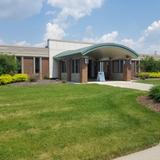- Kent State University's eight-campus network, one of the largest regional systems in the country, serves both the development of a true living/learning approach at the Kent Campus and regional needs on seven other campuses throughout Northeast Ohio. The Kent Campus provides the resources and facilities of a large, diverse university, while the Regional Campuses - Ashtabula, East Liverpool, Geauga, Salem, Stark, Trumbull and Tuscarawas - offer the friendly, casual atmosphere of small liberal arts colleges.
School Highlights
Kent State University at Ashtabula serves 2,858 students (8% of students are full-time).
The college's student-teacher ratio of 25:1 is higher than the state community college average of 22:1.
Minority enrollment is 20% of the student body (majority Black and Hispanic), which is less than the state average of 38%.
Quick Facts (2026)
- Enrollment: 2,858 students
- In-state tuition: $5,664
- Out-state tuition: $13,624
- Student-teacher ratio: 25:1
- Minority enrollment: 20%
- Source: Integrated Postsecondary Education Data System (IPEDS)
School Overview
The teacher population of 116 teachers has stayed relatively flat over five years.
Kent State University at Ashtabula
(OH) Community College Avg.
Carnegie Classification
Baccalaureate/Associate's Colleges: Associate's Dominant
Baccalaureate/Associate's Colleges: Mixed Baccalaureate/Associate's
Institution Level
Four or more years
At least 2 but less than 4 years
Institution Control
Public
Private not-for-profit
Year Founded
1958
Total Faculty
116 staff
93 staff
School Calendar
Student Body
The student population of Kent State University at Ashtabula has grown by 39% over five years.
The student-teacher ratio of 25:1 has decreased from 33:1 over five years.
The Kent State University at Ashtabula diversity score of 0.35 is less than the state average of 0.58. The school's diversity has stayed relatively flat over five years.
Total Enrollment
2,858 students
757 students
Student-Teacher Ratio
25:1
22:1
# Full-Time Students
228 students
397 students
# Part-Time Students
2,630 students
360 students
# Enrollment Undergraduate
285 students
313 students
# Full-Time Undergraduate Students
228 students
385 students
# Full-Time Graduate Students
n/a
10 students
# Part-Time Undergraduate Students
2,630 students
434 students
# Part-Time Graduate Students
n/a
3 students
Total Dormitory Capacity
n/a
425 students
% American Indian/Alaskan
n/a
n/a
% Asian
2%
4%
% Hispanic
5%
6%
% Black
7%
15%
% White
80%
62%
% Hawaiian
n/a
2%
% Two or more races
3%
4%
% Non Resident races
1%
1%
% Unknown races
2%
6%
Diversity Score
0.35
0.58
College Completion Rate (Students who graduate in less than 4 years)
10%
23%
College Completion Rate (Students who graduate in 4 years or more than 4 years)
11%
22%
Average Graduate Earnings (10 Years)
$39,700
$31,900
Tuition and Acceptance Rate
The public in-state tuition of $5,664 is more than the state average of $5,163. The in-state tuition has declined by 9% over four years.
The public out-state tuition of $13,624 is more than the state average of $10,843. The out-state tuition has declined by 9% over four years.
In-State Tuition Fees
$5,664
$5,163
Out-State Tuition Fees
$13,624
$10,843
% Students Receiving Some Financial Aid
94%
88%
Median Debt for Graduates
$25,000
$18,500
Median Debt for Dropouts
$8,750
$6,500
Acceptance Rate
n/a
73%
SAT Reading
n/a
460
SAT Math
n/a
475
SAT Writing
n/a
465
ACT Composite
n/a
21
ACT English
n/a
20
ACT Math
n/a
20
Source: 2024 (or latest year available) Integrated Postsecondary Education Data System (IPEDS) , School Administrators
School Notes
- Since its founding as a teacher-training school in 1910, Kent State has become an engine for economic, cultural and workforce development in the region and beyond as one of the premiere Ohio colleges. The university also has earned acclaim for applying new knowledge to address the needs of the communities it serves and society as a whole. The Ashtabula Center of Kent State University was opened in the old Park Avenue Junior High School building in 1958. Oliver C. Topky donated 80 acres of land for the new campus in 1963. Main Hall broke ground in December 1965 and opened for classes in the fall of 1967. The Library and Tech buildings were added in 1972. Overlooking Lake Erie on State Route 531 and encompassing 125 wooded and grassy acres, the Ashtabula Campus is the northern-most of Kent State University's eight-campus system. Comprised of the Main Hall, the Library and the Technology Building, our facilities house classrooms; engineering, computer, science and health science labs; an auditorium, gymnasium and cafeteria; conference/banquet rooms, and administrative and faculty offices. The grounds include tennis courts, a baseball field, picnic areas and an outdoor stage. Kent State Ashtabula provides a university education in a small liberal arts college environment. The faculty includes nearly 100 full- and part-time instructors. No classes are taught by graduate assistants. Students enjoy the small class sizes and individual attention usually found only at private colleges, while benefiting from all the resources of Kent State University, Ohio's third-largest university. Kent State University Ashtabula Campus offers educational coursework leading to five bachelor's degrees and 17 associate degrees, featuring one of Ohio's Physical Therapy Assistant programs, as well as programs in hospitality management and nursing. The campus is equidistant between Cleveland, Erie and Youngstown and provides academic excellence and enrichment to a student body comprised of commuters, many of whom work part or full-time. Physical Therapy Assistant programs like the one at Kent State Ashtabula can lead to challenging and rewarding work in rehabilitation centers, nursing homes, school systems and private clinics.
Frequently Asked Questions
How much does Kent State University at Ashtabula cost?
Kent State University at Ashtabula's tuition is approximately $5,664 for In-State students and $13,624 for Out-State students.
Recent Articles

Most In-Demand Community College Majors for 2025–26
Explore the most in-demand community college majors for 2025–26 workforce needs, aligned with hiring trends, wages, and transfer pathways.

New Guidebook Helps Students Navigate Community College
A new guidebook offers practical strategies to help students and families succeed in community college, from admissions to transfer and career planning.

Work-Study Opportunities for Spring 2026 Guide
Learn how to secure work-study opportunities for Spring 2026 before classes start, including timelines, tips, and eligibility guidance.










